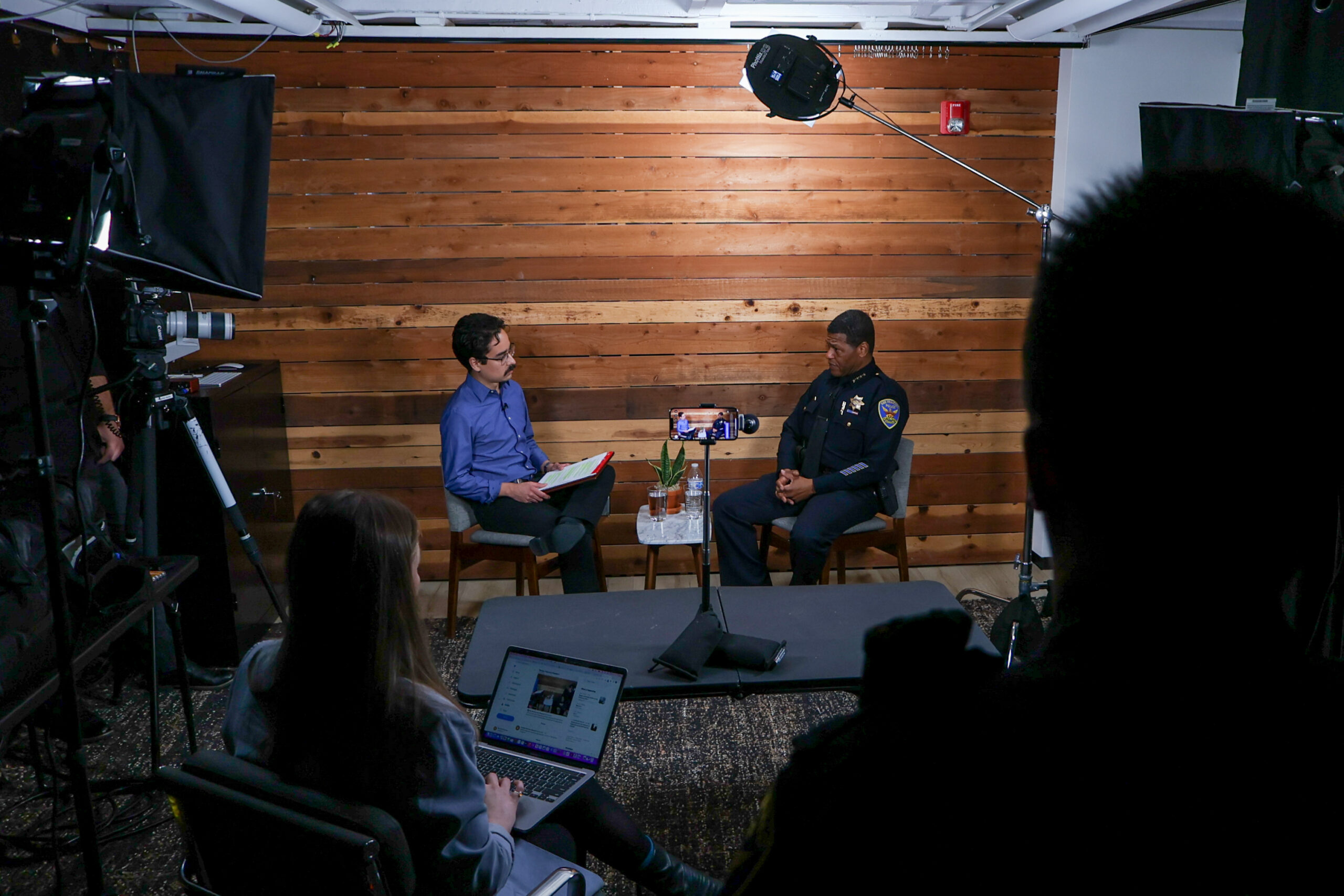San Francisco’s police department is considering banning officers from using minor traffic violations as a strategy to investigate drivers for more serious offenses, Police Chief Bill Scott told The Standard in an exclusive interview Thursday.
In a conversation broadcast live on Twitter, Scott said the department has been working with Max Carter-Oberstone, one of San Francisco’s newest police commissioners and an appointee of Mayor London Breed, on a proposed policy that would limit—or possibly even ban—pretextual stops as a means to reducing racial disparities in stop and arrest data. Los Angeles’ police department enacted a policy that limits when its officers can use pretextual stops earlier this month.
WATCH LIVE NOW: A Standard exclusive interview with @SFPDChief Bill Scott.
— The San Francisco Standard (@sfstandard) March 24, 2022
Our reporter Michael Barba @mdbarba will be asking about the Tenderloin, the Chief’s relationship with DA Boudin and more. https://t.co/b3uLci1Cft
A recent report found that San Francisco police stopped Black people at a rate of nearly 39 times per 1,000 residents in 2021. In comparison, data show SFPD stopped white people nearly seven times per 1,000 residents. San Francisco supervisors discussed the racial disparities at Tuesday’s board meeting.
“Bottom line, we have to address this disparity problem we have,” Scott said Thursday. “We can’t keep doing the same things and expect things to change.”
Scott said he hoped to have a policy before the Police Commission by the fall.
“Nothing is off the table right now,” he said.
— The San Francisco Standard (@sfstandard) March 24, 2022
DA Dustup
Scott also addressed his ongoing feud with District Attorney Chesa Boudin, which came to a head last month when the chief announced he was severing an agreement that put the prosecutor’s office in charge of investigating police shootings and other critical incidents. Just days after that abrupt decision, Boudin dropped his own bombshell by announcing he had evidence that police used a rape victim’s DNA to charge her with a crime in a separate case. All of this has played out against the backdrop of Boudin facing a recall election in June.
Scott declined to say whether he supports the recall, but was adamant he does not regret threatening to pull out of a reform agreement on investigations “one bit.”
The reform agreement on investigations was a critical part of police reforms instituted in 2019 after a wave of police shootings. The agreement was first signed by former DA George Gascón and renewed after Boudin took office.
Scott said he hopes to negotiate a new agreement with Boudin by late May
“We pick up the phone and call each other when we have issues, and sometimes they get resolved,” Scott said. “We don’t always agree, but we communicate.”
Rape Victim DNA
It does not appear DNA from other crime victims in San Francisco has been used to charge people in a review of 17 other cases that came up as hits in the department’s quality control DNA database, Scott said. However, that audit is continuing.
The chief said the department recently created a new policy that limits the period of time victims’ DNA evidence can be retained to 60 days. Until recently, the department was keeping this evidence in perpetuity.
“The one thing that we’ve already done is we no longer retain the DNA from victims other than 60 days, which is around the time it takes to do what needs to be done to make the quality assurances,” Scott said, adding that the department wants to “make sure victims of crimes are not disincentivized.”
State of the Department
Other issues Scott addressed included a crackdown on drug dealing in the Tenderloin, staffing shortages and low morale within the ranks.
“This is not an easy job to begin with, and there are a lot of things that have happened in policing since May 2020, ever since the murder of George floyd, and it set this profesion back on its heels,” Scott said. “People sometimes feel everybody is against the profession, the police department, but we have to keep doing our jobs.”
The Standard reviewed the tenure of previous San Francisco police chiefs and found the average chief lasts around four years.
Scott, who was sworn into the job in January 2017, said he has no plans to leave the position any time soon.
“This job has its challenges. It has its good days and its bad days, and it’s not for the weak of heart,” Scott said. “I love this job and I love working for this city, and I want to make a difference. And there’s some things I want to finish.”
